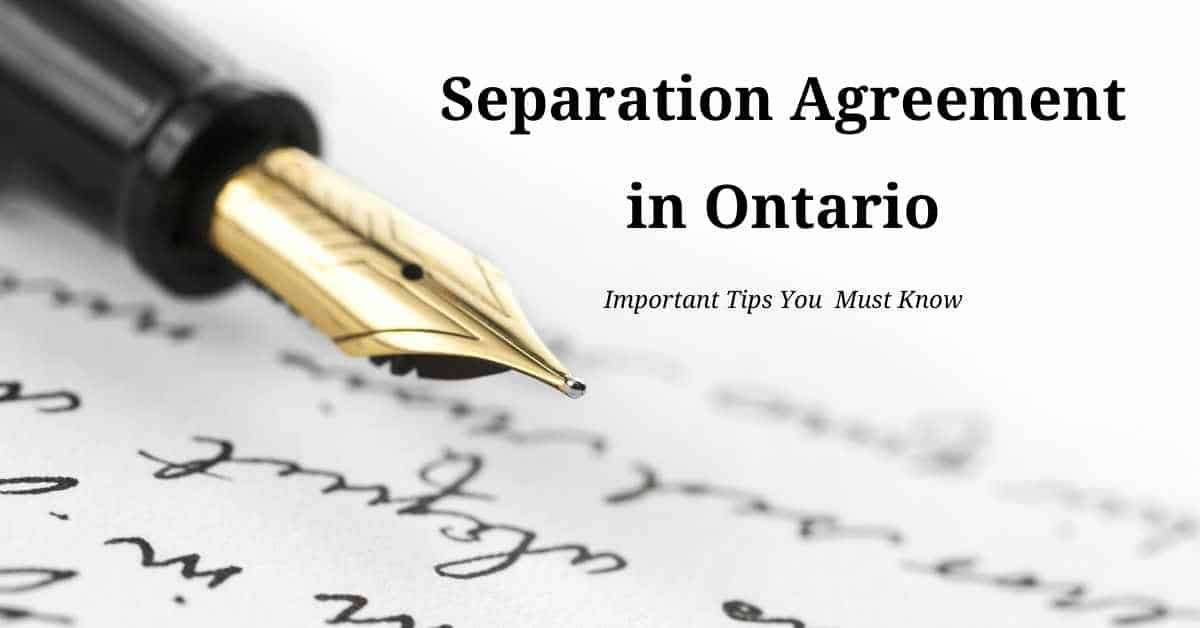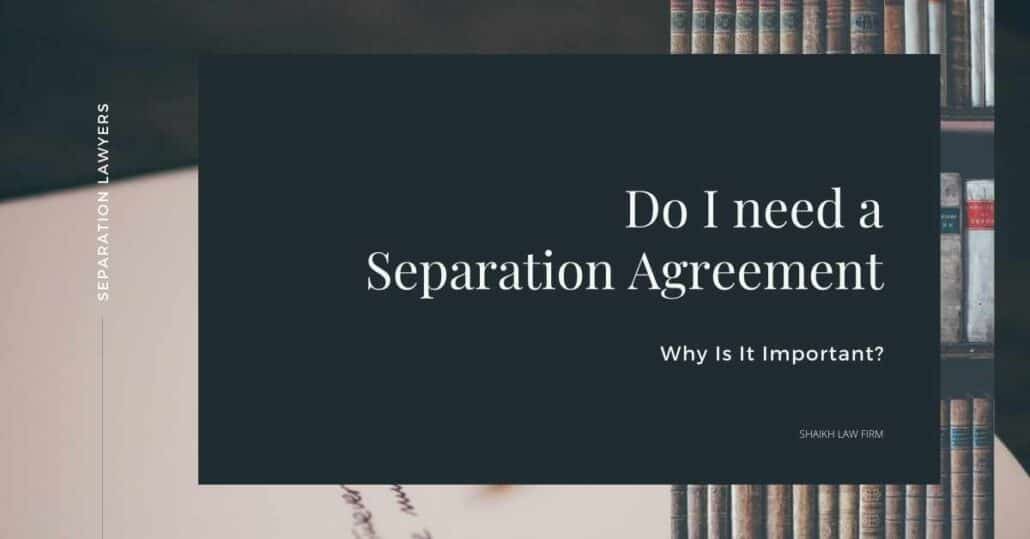A good Separation Agreement must include terms on Child Custody, Child Support, Spousal Support, Division of Property, Pension, Dispute Resolution & Divorce, if applicable.
Before we discuss these issues in detail, it is essential to know that section 54 of the Family Law Act deals with the Separation Agreement in Ontario, and it was amended in 2020, vide Moving Ontario Family Law Forward Act, 2020
A good Separation Agreement must include terms on Child Custody, Child Support, Spousal Support, Division of Property & Divorce, if applicable. Before we discuss these issues in detail, it is essential to know that section 54 of the Family Law Act deals with the Separation Agreement in Ontario, and it was amended in 2020, vide Moving Ontario Family Law Forward Act, 2020
Here is the amended section 54 of the Family Law Act.
“Two persons who cohabited and are living separate and apart may enter into an agreement in which they agree on their respective rights and obligations, including,
(a) ownership in or division of property;
(b) support obligations;
(c) the right to direct the education and moral training of their children;
(d) the right to decision-making responsibility or parenting time with respect to their children; and
(e) any other matter in the settlement of their affairs.”
Division of Property.
If you have acquired any property or accrued any liability/debt during the relationship, your separation agreement must determine how all the property is divided between couples.
You and your partner would need to calculate net family property value. The amount for net family property is arrived at after adding all assets’ value less any liabilities.
The agreement will then discuss how the net family property is equalized, for example, a lump-sum amount or the home’s sale. A separation agreement lawyer in Ontario can help you with your net family property calculations.
The process of calculating net family property could become complicated if it is inter-connected with a child or spousal support.
Possession of Matrimonial Home.
The agreement should discuss who will keep possession of the matrimonial home. In some cases, keeping the house is not financially possible for both parties, resulting in the home’s sale.
Therefore, the separation agreement should provide a mechanism on how to deal with the marital home.
Child Custody / Right to Decision making and parenting time.
In 2020, the “the right to custody of and access to their children” was repleaded and replaced a new term “right to decision making and parenting time”.
The separation agreement must clearly define who will be responsible for primary care and control of children and make decisions for them.
The agreement should give you a guideline about the decision-making process and, in the event of a conflict, who will have final decision-making authority.
The agreement must spell out parenting time and parenting plan details during the entire year and following years.
Children need certainty in their lives; therefore, the agreement should discuss how much time a child will spend with each parent, including the holidays such as summer and winter vacation.
If one parent wishes to relocate, then the agreement should address how this will affect decision-making and parenting time.
An experienced separation agreement lawyer can help you with a detailed parenting plan based on your specific needs and requirements.
Right to direct education and moral training of their children. The right to direct education and moral training of children is an essential element of the separation agreement.
The agreement should provide guidelines for who will be responsible for choosing children’s education method; for example, children should go to french or English schooling, or children need to attend piano lessons including child’s religious and moral training.
The court would uphold the separation agreement if children’s best interests were a paramount consideration.
Child Support.
The separation agreement will discuss if any child support is to be paid and to whom. The child support table was updated in 2017 by the Government of Canada.
Child support is calculated based on the number of children, the province and payor income.
It would be prudent to write a clause when the child support amount should terminate since child support can not automatically terminate when the child becomes an adult.
Special & Extraordinary Expenses for the Child. If there are special or extraordinary expenses for the child, such as extracurricular activities, private schooling, special needs etc.
Your separation agreement should cover who will pay for such expenses, what amount or what percentage, and how the receipts will be exchanged for such expenses.
Ontario Separation Agreement lawyers are experienced in such matters; therefore, it is wise to contact them for professionally drafting a separation agreement.
Spousal Support:
It is important to mention if any spousal support is payable, how much and for how long from one party to another.
The agreement should guide what circumstances support can be terminated, such as the retirement of the payor or the recipient’s remarriage.
In some situations, a spouse may waive his or her right to claim support.
If spousal support is waived, then an appropriate clause should explain why support is waived, for example, an additional share in the property or marital home division.
Medical and Dental Benefits:
At times, couples wish to add relevant clauses to extend their employer’s medical and dental benefit plans for their children.
A specified procedure would help parties to recover covered and uncovered medical and dental expenses.
Life Insurance:
Like medical benefits, a party may wish to keep the other party or the children as beneficiaries on their life insurance even after separation.
Pensions, RRSP & Investment Accounts:
A pension or RRSP is an asset, and it will be calculated as part of the net family property. Therefore, if either party has a Pension or RRSP, you should calculate the value as part of your net family property.
Dispute Resolution:
A well-drafted agreement always has a mechanism for dispute resolution. In the event of a dispute in the future, the parties should have a specific procedure to resolve conflicts, such as naming a mediator or a general reference to appointing an arbitrator to settle a dispute.
Divorce:
A good separation agreement should also address the issue of Divorce for married couples.
A clause in the agreement to allow either party to file an uncontested divorce a simple or a Joint Divorce would prevent unnecessary complications in the future.






